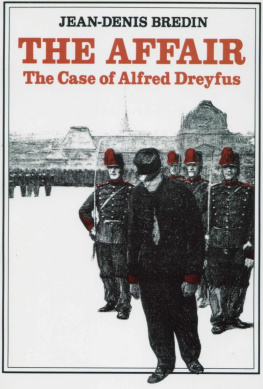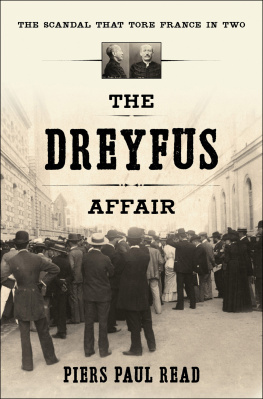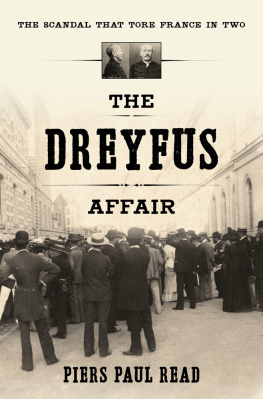C HRONOLOGY
P RINCIPALS:
Maurice Barrs: 1862-1923
Marcelin Berthelot: 1827-1907
Eugne Bontoux: 1820-1905
Georges Boulanger: 1837-1891
Georges Clemenceau: 1841-1929
Alfred Dreyfus: 1859-1935
douard Drumont: 1844-1917
Gustave Eiffel: 1832-1923
Jules Ferry: 1832-1893
Lon Gambetta: 1838-1882
Ferdinand de Lesseps: 1805-1894
Patrice de MacMahon: 1808-1893
Louis-douard-Dsir Pie: 1815-1880
Pius IX: 1792-1878
Jacques de Reinach: 1840-1892
Ernest Renan: 1823-1892
Adolphe Thiers: 1797-1877
mile Zola: 1840-1902
1848
F EBRUARY: Paris revolts against the constitutional monarchy established after the Revolution of 1830. King Louis-Philippe flees and the Second Republic is proclaimed.
J UNE: In a second uprising, the Parisian populace, goaded by economic hardship, threatens the republican government and is crushed.
D ECEMBER: Louis-Napolon, Napolon Bonapartes nephew, captures 75 percent of the vote in an election for the presidency.
1851
D ECEMBER: Louis-Napolon carries out a coup dtat. One year later, he will emerge from a plebiscite as Napolon III and establish the Second Empire.
18531856
The Crimean War, fought between Imperial Russia on one side and an alliance of France, the United Kingdom, Sardinia, and the Ottoman Empire on the other.
1857
Lieutenant Georges Boulanger, in North Africa, fights in his first campaign, against Kabyles.
1859
A PRIL: France, in alliance with Piedmont-Sardinia, declares war against Austria. Two major battles take place in Northern Italy, at Magenta and Solferino. Lieutenant Boulanger serves under General MacMahon. Fighting on another front is Gustave Eiffels father.
1863
Michel Lvy publishes Ernest Renans Vie de Jsus, stirring enormous controversy. It will be one of the two or three best-selling books published in France in the nineteenth century.
Georges Boulanger serves with the French colonial army in Southeast Asia.
1864
Pius IX issues the encyclical Quanta Cura, containing The Syllabus of Errors.
1867
A PRIL: The Exposition Universelle opens.
1869
A Vatican Council is convoked to condemn modern errors deriving from rationalism. It affirms the doctrine of papal infallibility. It concluded in October 1870.
1870
J ULY: France declares war against Prussia and her German allies.
S EPTEMBER 1: Defeated at the battle of Sedan, Napolon III abdicates. Three days later, on September 4, the Empire gives way to a Government of National Defense, whose animating spirit is Lon Gambetta.
S EPTEMBER 19: The German Army besieges Paris.
1871
J ANUARY: An armistice is declared; the siege is lifted.
F EBRUARY: Nationwide elections of a National Assembly are held, to form a government with which Germany can treat.
M ARCH: The government moves from Bordeaux to Versailles, but is not recognized by Paris, where National Guard regiments proclaim a Commune and organize elections. (Paris is again besieged, this time by a French army.)
M AY: France cedes Alsace and part of Lorraine to Germany in the Treaty of Frankfurt.
J UNE 21-29: Adolphe Thiers unleashes the Versailles army on Paris, under Marshal MacMahon, in a bloody campaign known as la semaine sanglante.
S EPTEMBER: The National Assembly confers the title of president of the Republic on Thiers, but, paradoxically, the conservative majority refuses to confer the title of Republic on the State.
1872
M AY: The first group of Communards condemned to transportation departs for New Caledonia. Trials of Communards, resulting in imprisonment or execution, take place throughout the year.
S EPTEMBER: Religious fervor swells the ranks of pilgrims to sites consecrated by mystical visitations: Lourdes, La Salette, and elsewhere.
1873
J ANUARY: Napolon III dies in England.
M AY: Thiers is forced to resign the presidency by a conservative coalition, which elects Marshal Patrice de MacMahon for a term of seven years, inaugurating a reactionary regime known as the Septennate, or, more often, lOrdre Moral. Forbidden thenceforth is the celebration of Revolutionary events such as the capture of the Bastille (July 14) and establishment of the First Republic (September 21).
J UNE: A pilgrimage to the Cluniac basilica of the Sacred Heart at Paray-le-Monial attracts tens of thousands. The National Assembly authorizes expropriations for the construction of a basilica in Montmartre.
A UGUST: Pretenders representing the two branches of the French royal family establish a line of succession, the Comte dOrlans agreeing to follow the Comte de Chambord; in October, however, Chambord will effectively withdraw from any future in French politics by announcing that he will never consent to reign under the tricolor flag.
1874
Frmiets statue of Joan of Arc is unveiled at the place des Pyramides.
1875
J ANUARY: The universal jubilee of the Catholic Church commences.
With passage of the Wallon amendment, the government is officially designated a Republic.
J UNE: The archbishop of Paris presides at the laying of the cornerstone of the Sacr-Coeur de Montmartre.
1876
F EBRUARY: In legislative elections, republicans emerge with a decisive majority.
1877
M ARCH: Pius IX protests against anticlerical laws passed by Italian legislators. In France, Catholics petition the government to intervene.
In the Chamber of Deputies, Gambetta, reacting to ultramontane agitation, makes his famous pronouncement Le clricalisme, voil lennemi!
M AY 16: MacMahon attempts to establish an autocratic presidency by dissolving parliament. Three hundred sixty-three Republican deputies issue a manifesto of protest.
S EPTEMBER: Adolphe Thiers dies. Hundreds of thousands in Paris witness his funeral cortege.
O CTOBER: In legislative elections, the republican Left increases its majority.
1878
The Chamber of Deputies passes a law severely curtailing the power of the president to adjourn or dissolve the Assembly.
F EBRUARY: Pius IX dies and is succeeded by Leo XIII.
M AY -N OVEMBER: The first Exposition Universelle of the Third Republic takes place.
M AY: Eugne Bontoux is appointed director of the Union Gnrale investment bank.
J UNE -J ULY: The Congress of Berlin, hosted by Bismarck, reorganizes the Balkan states following the Russo-Turkish war.
N OVEMBER: Leo XIII promulgates his encyclical De inscrutabili deiconsilio (On the Evils of Society). Now the source of these evils, we are convinced, lies chiefly in this, that the holy and venerable authority of the Church, which in Gods name rules mankind, upholding and defending all lawful authority, has been despised and set aside.















